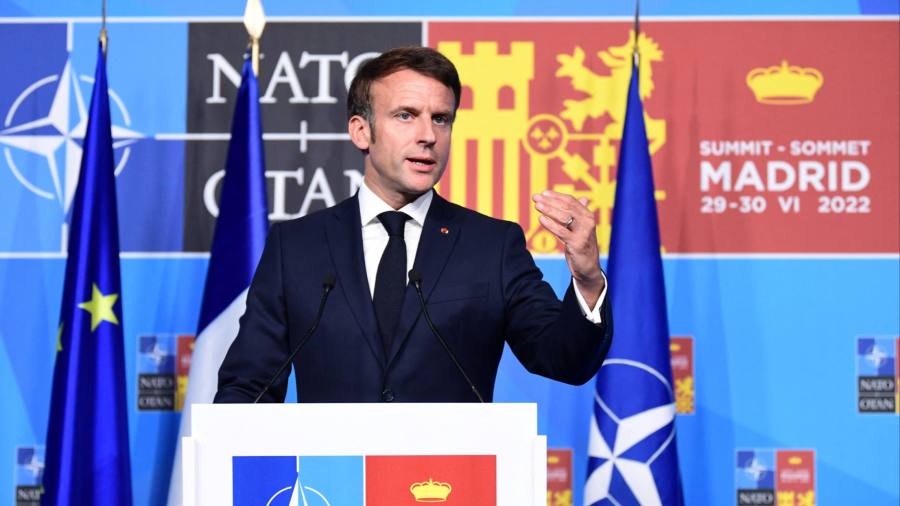French president Emmanuel Macron has objected to a Nato proposal to open an office in Tokyo because he believes the transatlantic security alliance should remain focused on its own north Atlantic region.
The resistance from France has complicated months of discussion within Nato to create the alliance’s first outpost in the Indo-Pacific region, according to eight people familiar with the situation.
The push to open a small base in Tokyo next year comes as the US and Japan urge Europe to become more involved in Asia security issues, particularly as concern mounts about possible future Chinese military action against Taiwan.
But the decision has coincided with Beijing slamming US efforts to create what it describes as anti-China coalitions in the Indo-Pacific, which it compares to an “Asian Nato”.
One French official said Paris believed Nato’s charter required the alliance to limit its geographic reach to the “north Atlantic”. But the official also suggested it could undermine European credibility with China in regard to the war in Ukraine, particularly in terms of asking Beijing not to supply arms to Russia.
One of the people familiar with the debate inside Nato said France was reluctant to back anything “that contributes to Nato-China tension”.
Speaking at a conference last week, Macron said Nato should not expand its reach beyond the north Atlantic and added: “If . . . we push Nato to enlarge the spectrum and the geography, we will make a big mistake.”
Macron’s resistance comes two months after he angered the US and other allies by suggesting, during a visit to China, that Europe should distance itself from US-China tensions over Taiwan.
Setting up a new Nato office requires unanimous support from the North Atlantic Council, Nato’s highest political decision-making body, which means France has the power to stop the move. Nato declined to give details about “ongoing deliberations”.
The Japanese government did not comment. But a Japanese official said Tokyo wanted to strengthen ties with the alliance. The White House did not respond to a request for comment.
Japan and Nato have been discussing opening a Tokyo office since then prime minister Shinzo Abe visited Nato headquarters in 2007. Tokyo opened a Nato branch office in Brussels in 2018. Prime Minister Fumio Kishida, who last year became the first Japanese leader to attend a Nato summit, will join the upcoming meeting in Lithuania in July.
Nato has more than a dozen liaison offices or delegations around the world, in nations such as Ukraine and Moldova. Most are small and designed to help contact with the host country’s government and military.
Yuka Koshino, a Japan expert at the IISS think-tank, said a Tokyo office would make Nato’s Indo-Pacific engagement formal and sustainable.
“Kishida sees strong links between the Euro-Atlantic and Indo-Pacific strategic environment . . . and seeks to co-ordinate approaches with like-minded partners,” said Koshino.
Nobukatsu Kanehara, a former top official in the Abe administration, said Japan was supporting Ukraine because it believed issues on both ends of Eurasia were connected. “The relationship between Japan and Nato has become rapidly closer because they have China in mind,” he said.
Speaking at the Shangri-La Dialogue security forum in Singapore on Saturday, EU foreign policy chief Josep Borrell said Europe and Asia had “a direct stake in each other’s security” and must work together to avoid a confrontation in the Indo-Pacific.
Read the full article here




